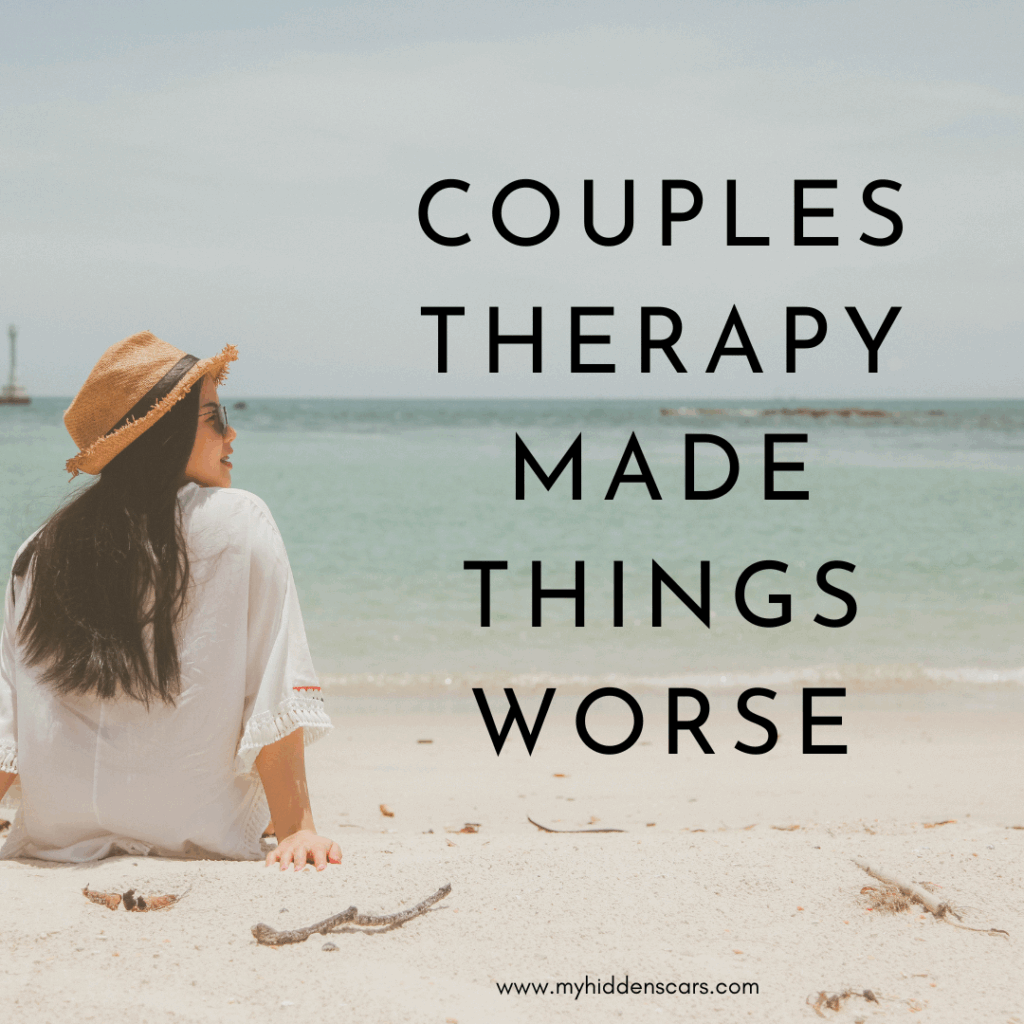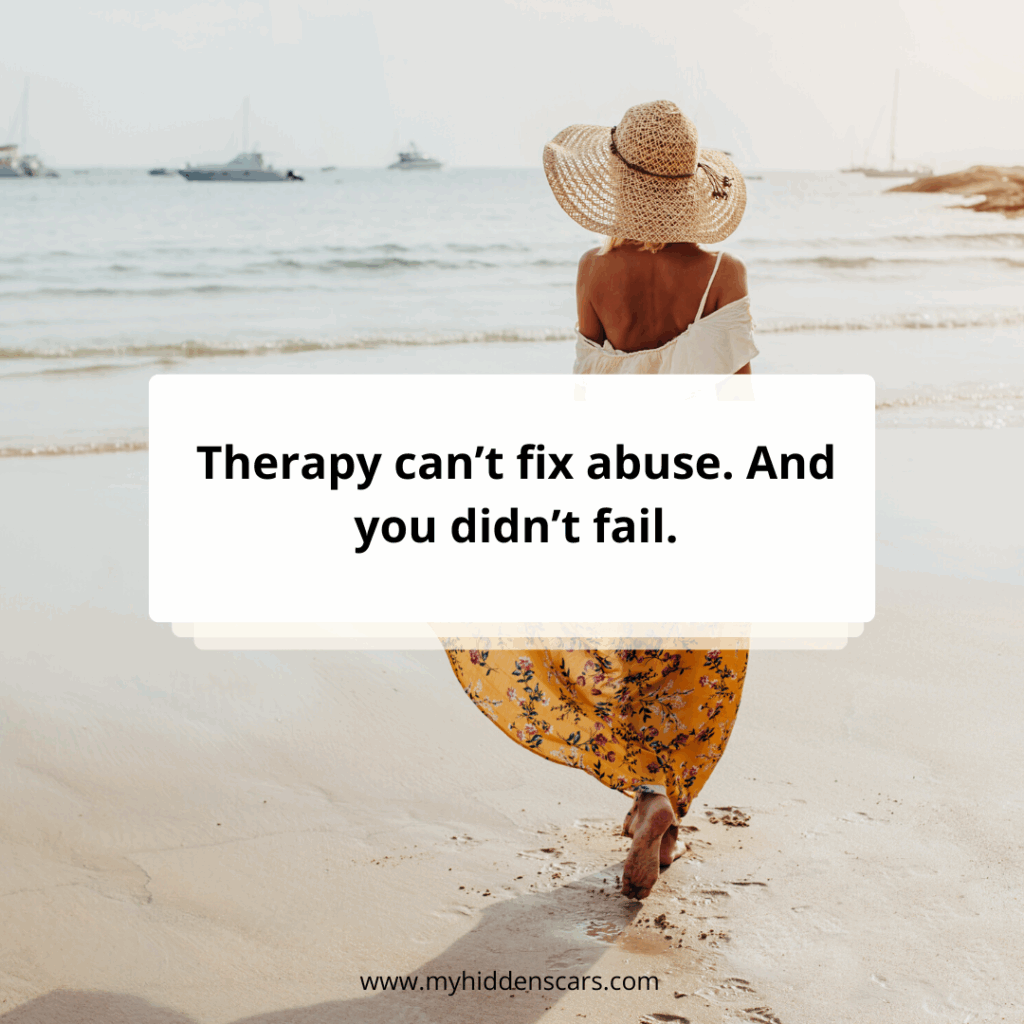I didn’t know therapy could make things worse.

Couples therapy with an abusive partner isn’t what most people think it is. I’ve been there, hoping it would help, hoping it would change things. But instead of feeling seen or supported, I left those sessions feeling smaller, more confused, and even more alone.
I just wanted to save our relationship, even if that meant going to couples therapy with an abusive partner again and again, hoping something would finally change.
Most of the time, it was my ex who pushed for therapy, telling me we needed help because I was the problem. I agreed, over and over again, hoping that maybe this time would be different. Maybe therapy could help us communicate better. That maybe someone else could finally see what I couldn’t explain.
But looking back now, I see it clearly:
Every time we went to couples therapy, he used it as another weapon.
He’d win over the therapist with charm and calmness while I sat there confused, hurt, and unraveling. He’d gather intel, new things to use against me, new ways to twist the narrative. And when we left? Nothing changed, except he had more tools to manipulate me.
Our last session was the one that broke something open in me. As we walked out, the therapist looked at us and asked, “Is it always like this with you two?” Her head was spinning. She looked lost. And that’s when I knew: she couldn’t help us. She didn’t see what was really going on. And I didn’t have the words to explain it yet, either.
I didn’t know he was abusive. I didn’t know he was a narcissist. I just knew I was drowning, and therapy was pulling me under faster.
Why Couples Therapy Can Be Dangerous with an Abusive Partner
Couples therapy works when both people want to communicate better, take responsibility, and work toward change.
But abuse isn’t a communication issue. It’s a control issue.
And when one person is manipulative, emotionally unsafe, or abusive, therapy doesn’t create healing. It can actually make things worse.
Many survivors walk into couples therapy with an abusive partner, thinking it might help, only to walk out feeling blamed, invalidated, or used.
Therapy can be powerful, but couples therapy with an abusive partner often makes things worse.
Here’s how it happens:
They perform in the therapy.
Abusers know how to look calm, reasonable, even caring, especially when someone else is watching. In therapy, they often charm the therapist and shift the focus to your “reactions.”
You go in hoping someone will finally see what’s happening behind closed doors. But somehow, by the end of the session, you’re the one being asked to be more patient, to “stay calm,” to try harder.
Example: You bring up how he shuts down during arguments or makes jokes at your expense in front of the kids. He leans back and says, “I’m trying to keep things light. She just takes everything the wrong way.”
The therapist turns to you and says, “Could it be that you’re feeling overly sensitive in those moments?”
You leave wondering if maybe it really is you.
Everything I said became a weapon.
In a safe relationship, therapy helps both people feel seen. But with an abuser, therapy becomes an information-gathering mission. He listens carefully, not to understand, but to collect.
He stores what you say. Your fears. Your past. The words you use. And later, he brings them back up, not with kindness, but with cruelty.
Example: You share in therapy that you sometimes feel insecure because of things from your childhood. Later that night, he sneers, “You’re so messed up, it’s no wonder no one can deal with you. You basically admitted it today.”
What felt like a moment of vulnerability becomes another reason to question yourself.
He made my pain the evidence.
Therapy is built on vulnerability. But when you open up in a session with someone abusive, your honesty gets twisted and weaponized.
“You said it yourself, you’re unstable.”
“You told the therapist you’re overwhelmed. Don’t blame me.”
He takes your pain and uses it to prove his point.
You try to be open, to do the work, but somehow everything you say becomes a reason you’re the one who needs fixing.
She stayed neutral, but it wasn’t neutral.
Most therapists are trained to stay neutral. They aren’t always taught to spot coercive control, DARVO, or emotional gaslighting, especially when it’s subtle, polished, and wrapped in charm.
So they try to help both of you.
But when one person is using therapy as a tool to control, “both sides” thinking isn’t fair. It’s harmful.
The therapist might say things like:
- “You both need to work on communication.”
- “It sounds like there’s blame on both sides.”
But when abuse is involved, neutrality isn’t neutral, it’s just another way you’re left unprotected.
It gave me hope he didn’t earn.
You think, “At least he’s willing to go. Maybe that means something.”
You sit across from him, telling yourself this is a good sign. That maybe things can get better. That therapy will help.
But showing up isn’t the same as showing up honestly. It’s not the same as taking responsibility. Or wanting to change.
Sometimes, going to therapy is just another way for him to look like the good guy. Another way to say, “See? I’m trying,” while quietly continuing to hurt you at home.
You cling to the idea that it means something. But it only works if he means it, too.
I left feeling smaller every time.
Not every session. But often enough.
I walked in hopeful, maybe this time would be different. Maybe he couldn’t twist the truth again. Maybe someone would finally see.
But instead, I walked out questioning myself.
Was I overreacting? Was I too emotional? Was it actually my fault?
The therapy room became another place where I lost my voice.
That’s not what therapy is supposed to do. That’s not what healing feels like. And if you’ve felt that too, you’re not the problem.
When Therapy Helps, and When It Harms
Therapy can be life-changing. But only when it’s safe.
If you’re in a relationship where there’s abuse, emotional, verbal, psychological, or physical, couples therapy is not the answer.
Abuse requires a different approach. One where safety, autonomy, and specialized support come first.
A qualified therapist who understands abuse can help you sort through what’s happening and figure out your next steps. But that doesn’t happen in a room where the abuser is sitting next to you, rewriting the story as you tell it.
You didn’t fail by going to therapy.
You didn’t fail by hoping it could help.
You didn’t fail by trying to fix what you never broke.
You were doing what so many of us do, trying to hold a relationship together with someone who was tearing you down behind closed doors.
But couples therapy doesn’t fix control.
It doesn’t heal manipulation.
And it doesn’t work when only one person is willing to be honest.
If you left therapy feeling worse, more confused, more ashamed, more alone, that’s not your fault.
That’s the impact of sitting in a room where your pain was twisted into proof that you were the problem.
If that’s your story, I want you to know this:
You’re not crazy. You’re not overreacting. And you’re not alone.
You were in survival mode. And now you get to step into healing.
So What Does Help?

If couples therapy with an abusive partner didn’t help or made things worse, you are not alone. And you didn’t fail. It failed you.
Because healing doesn’t happen in a space where you’re being controlled, blamed, or manipulated. It happens in safe spaces. Supportive spaces. Ones where your pain is honored, your voice is heard, and you’re not being asked to “meet in the middle” with someone who’s hurting you.
What actually helps is:
- Working with a therapist or coach who understands abuse and coercive control.
- Documenting what’s happening—not just for court, but to remind yourself it’s real.
- Getting quiet enough to trust your gut again.
- Being believed. Even if it’s just by one person at first.
- Choosing you. Even when it’s scary. Especially then.
So What Does Help?
If couples therapy with an abusive partner didn’t help or made things worse, you are not alone. And you didn’t fail. It failed you.
Because healing doesn’t happen in a space where you’re being controlled, blamed, or manipulated. It happens in safe spaces. Supportive spaces. Ones where your pain is honored, your voice is heard, and you’re not being asked to “meet in the middle” with someone who’s hurting you.
What actually helps is:
- Working with a therapist or coach who understands abuse and coercive control.
- Documenting what’s happening—not just for court, but to remind yourself it’s real.
- Getting quiet enough to trust your gut again.
- Being believed. Even if it’s just by one person at first.
- Choosing you. Even when it’s scary. Especially then.
If you’ve been through couples therapy with an abusive partner and walked away feeling worse, please hear this: it’s not your fault.
You deserve more than someone who uses your pain against you. You deserve healing that doesn’t gaslight you.
Couples therapy with an abusive partner can make it even harder to trust yourself, and that’s not okay.
And if you’re not sure where to start, I’m here.
If you’re in this situation now:
You don’t have to go through it alone. I work with women who are in the thick of it, just coming out of it, or still trying to make sense of it all.
I offer 1-on-1 coaching sessions and will walk alongside you, whether you need strategy, documentation help, or just someone who understands what this really looks like.
Want to talk more or see if coaching is right for you? Click here to learn more.
Additional Resources
- Why Does He Do That? by Lundy Bancroft
- The Verbally Abusive Relationship by Patricia Evans
- My blog post on documentation (for navigating legal situations with a manipulative partner)
Author: Tiffany Colburn
Coach | Advocate | Survivor
If this post resonated with you, I’d love for you to share it or reach out. You’re not alone.





